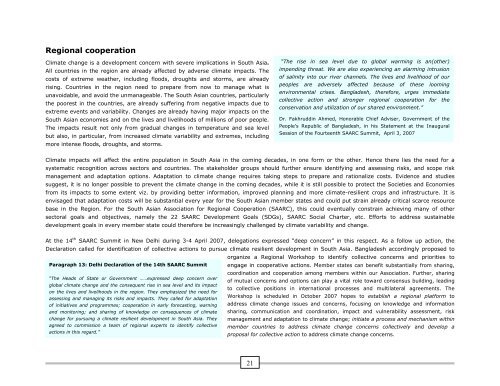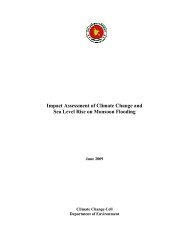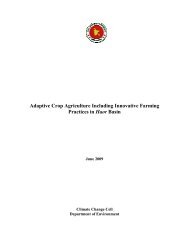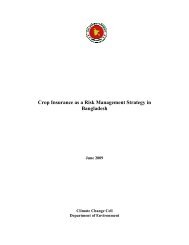CLIMATE CHANGE AND BANGLADESH
CLIMATE CHANGE AND BANGLADESH
CLIMATE CHANGE AND BANGLADESH
Create successful ePaper yourself
Turn your PDF publications into a flip-book with our unique Google optimized e-Paper software.
Regional cooperation<br />
Climate change is a development concern with severe implications in South Asia.<br />
All countries in the region are already affected by adverse climate impacts. The<br />
costs of extreme weather, including floods, droughts and storms, are already<br />
rising. Countries in the region need to prepare from now to manage what is<br />
unavoidable, and avoid the unmanageable. The South Asian countries, particularly<br />
the poorest in the countries, are already suffering from negative impacts due to<br />
extreme events and variability. Changes are already having major impacts on the<br />
South Asian economies and on the lives and livelihoods of millions of poor people.<br />
The impacts result not only from gradual changes in temperature and sea level<br />
but also, in particular, from increased climate variability and extremes, including<br />
more intense floods, droughts, and storms.<br />
“The rise in sea level due to global warming is an(other)<br />
impending threat. We are also experiencing an alarming intrusion<br />
of salinity into our river channels. The lives and livelihood of our<br />
peoples are adversely affected because of these looming<br />
environmental crises. Bangladesh, therefore, urges immediate<br />
collective action and stronger regional cooperation for the<br />
conservation and utilization of our shared environment.”<br />
Dr. Fakhruddin Ahmed, Honorable Chief Adviser, Government of the<br />
People's Republic of Bangladesh, in his Statement at the Inaugural<br />
Session of the Fourteenth SAARC Summit, April 3, 2007<br />
Climate impacts will affect the entire population in South Asia in the coming decades, in one form or the other. Hence there lies the need for a<br />
systematic recognition across sectors and countries. The stakeholder groups should further ensure identifying and assessing risks, and scope risk<br />
management and adaptation options. Adaptation to climate change requires taking steps to prepare and rationalize costs. Evidence and studies<br />
suggest, it is no longer possible to prevent the climate change in the coming decades, while it is still possible to protect the Societies and Economies<br />
from its impacts to some extent viz. by providing better information, improved planning and more climate-resilient crops and infrastructure. It is<br />
envisaged that adaptation costs will be substantial every year for the South Asian member states and could put strain already critical scarce resource<br />
base in the Region. For the South Asian Association for Regional Cooperation (SAARC), this could eventually constrain achieving many of other<br />
sectoral goals and objectives, namely the 22 SAARC Development Goals (SDGs), SAARC Social Charter, etc. Efforts to address sustainable<br />
development goals in every member state could therefore be increasingly challenged by climate variability and change.<br />
At the 14 th SAARC Summit in New Delhi during 3-4 April 2007, delegations expressed “deep concern” in this respect. As a follow up action, the<br />
Declaration called for identification of collective actions to pursue climate resilient development in South Asia. Bangladesh accordingly proposed to<br />
organize a Regional Workshop to identify collective concerns and priorities to<br />
Paragraph 13: Delhi Declaration of the 14th SAARC Summit engage in cooperative actions. Member states can benefit substantially from sharing,<br />
coordination and cooperation among members within our Association. Further, sharing<br />
“The Heads of State or Government ……expressed deep concern over<br />
of mutual concerns and options can play a vital role toward consensus building, leading<br />
global climate change and the consequent rise in sea level and its impact<br />
to collective positions in international processes and multilateral agreements. The<br />
on the lives and livelihoods in the region. They emphasized the need for<br />
Workshop is scheduled in October 2007 hopes to establish a regional platform to<br />
assessing and managing its risks and impacts. They called for adaptation<br />
of initiatives and programmes; cooperation in early forecasting, warning address climate change issues and concerns, focusing on knowledge and information<br />
and monitoring; and sharing of knowledge on consequences of climate sharing, communication and coordination, impact and vulnerability assessment, risk<br />
change for pursuing a climate resilient development in South Asia. They management and adaptation to climate change; initiate a process and mechanism within<br />
agreed to commission a team of regional experts to identify collective member countries to address climate change concerns collectively and develop a<br />
actions in this regard.”<br />
proposal for collective action to address climate change concerns.<br />
21





